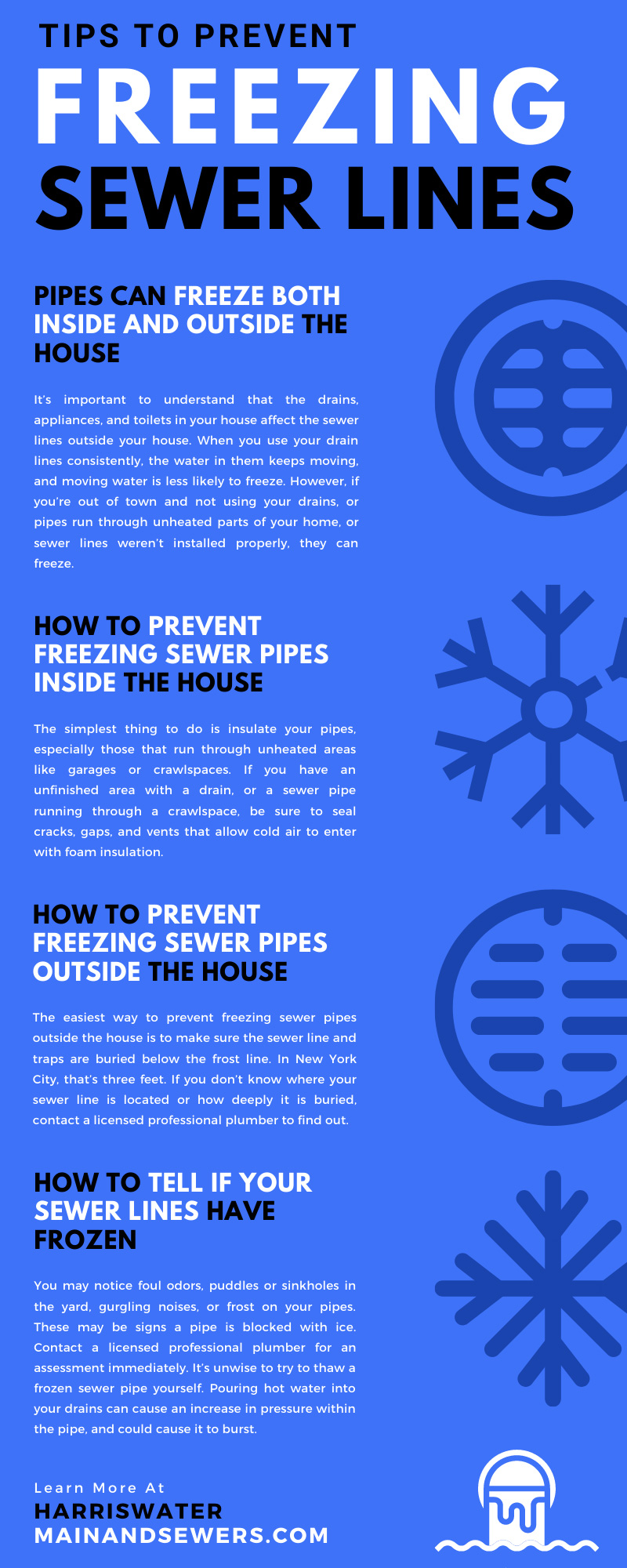Sewer lines can freeze, even if they are buried below the frost line. Extremely cold weather can send ice into drain systems. If left unused, without warm wastewater flowing through sewer lines, the pipes can freeze and burst. The following tips to prevent frozen sewer lines will help you avoid a winter plumbing disaster.
Pipes Can Freeze Both Inside and Outside the House
It’s important to understand that the drains, appliances, and toilets in your house affect the sewer lines outside your house. When you use your drain lines consistently, the water in them keeps moving, and moving water is less likely to freeze. Sewer lines buried beneath the frost line typically stay at about 60 degrees, unless something very unusual has happened. However, if you’re out of town and not using your drains, or pipes run through unheated parts of your home, or sewer lines weren’t installed properly, you may end up with frozen water pipes. When drains don’t consistently deliver water to the sewer line outside the house, it puts that pipe in danger too, if the pipe isn’t buried below the frost line.
If sewer lines outside the house are exposed to an open drain with snow or ice entering, or a sudden drop in temperature occurs, they can freeze. Complicating matters are the traps in drains. Most New York City sewer drains have a double-vented trap, to keep sewer gasses from entering your home from the city sewer line. If the caps are missing, frigid air can freeze the water in the trap. The same can happen with unprotected access pits.
How To Prevent Freezing Sewer Pipes Inside the House
The simplest way to prevent frozen sewer lines is to insulate your pipes, especially those that run through unheated areas like garages or crawlspaces. If you have an unfinished area with a drain, or a sewer pipe running through a crawlspace, be sure to seal cracks, gaps, and vents that allow cold air to enter with foam insulation.
Check the insulation in the garage and weatherstripping around doors that lead from the garage to the backyard or the side of the house. Keep water moving in your pipes in frigid weather. You can leave faucets trickling overnight when the forecast predicts freezing temperatures.
Service your water heater and turn it up a bit (but not to scalding temperatures) to ensure hot water is flowing on demand in the house. Keep your heat turned up to at least 55 degrees to ensure warm air is circulating around your home.
How To Prevent Freezing Sewer Pipes Outside the House
The easiest way to prevent frozen sewer pipes outside the house is to make sure the sewer line and traps are buried below the frost line. In New York City, that’s three feet. If you don’t know where your sewer line is located or how deeply it is buried, contact a licensed professional plumber to find out.
Sometimes a drain trap near the house isn’t buried deeply enough, or is in an unheated garage, exposed to cold air. Drain traps also are at risk if clogged gutters allow ice to form and drip cold water into a drain connected to a sewer. This can freeze the water in the trap and cause a blockage that can damage the pipes.
Make sure your gutters are free of leaves, twigs, and debris, and that the downspouts provide a path to carry water away from your foundation. Add downspout extensions if necessary. Clear leaves, snow, and ice from outside drain grates. Snow or ice on top of a drain grate can have the same effect as icy drips from a frozen gutter.
Another simple way to prevent frozen sewer lines is to keep water moving through them. Unused pipes that don’t have a constant flow of water running through them are at greater risk of freezing. When the weather forecast predicts frigid temperatures, keep faucets trickling a little bit overnight. All the water that goes down your drains enters your sewer line and keeps water moving through it properly.
How To Tell if Your Sewer Lines Have Frozen
You may notice foul odors, puddles or sinkholes in the yard, gurgling noises, or frost on your pipes if you have frozen sewer lines. These may be signs a pipe is blocked with ice. Contact a licensed professional plumber for an assessment immediately.
It’s unwise to try to thaw a frozen sewer pipe yourself. Pouring hot water into your drains can cause an increase in pressure within the pipe, and could cause it to burst. Hot water might cause ice that is clogging the pipe to shift and move within the pipe, but this creates the risk that the ice will simply lodge or reform at another point in the pipe. Pipes burst at their weakest point—there may be a hairline crack or damage from invading tree roots, and the pressure that builds up behind an ice blockage will cause a rupture at that weak point.
Some have suggested using space heaters in poorly insulated or unheated areas of the home to prevent or thaw frozen water pipes. This is ineffective (it takes a very long time to provide any thawing) and dangerous. Space heaters create fire hazards. They can overload circuits or tip over and ignite flammable materials left nearby.
If you notice signs of a frozen sewer line, it is imperative to contact a licensed, professional plumber right away to minimize the potential damage to your home. Remember that not every plumbing professional is licensed to do work outside and underground. A frozen or burst sewer line requires a professional who has experience with excavation, repair, and new sewer line installation. This work also requires expertise in city regulations, and knowledge about Department of Environmental Protection and Department of Transportation inspections and rules.
Many New York City sewer lines are very old, and some may be made of clay that is more susceptible to damage. Although a rupture in an old sewer pipe might be repairable, you run the risk of multiple repairs and excavations. If there’s a frozen water main, replacing the entire sewer line with durable cast iron is more cost-effective over time.
Sewer line replacement requires a major excavation, breaking through concrete in the street, and digging far below street level. To perform this type of work, the sewer replacement company must hold a New York City Master Plumber’s license, have enough insurance coverage, and hold a bond from the NYC Department of Transportation. The new line must be installed according to current codes, and the connection to the city sewer must pass inspection by DEP personnel. If you need sewer line repair services, make sure you contact an experienced master plumber licensed to do work underground, like us here at Harris Water Main and Sewer.





















